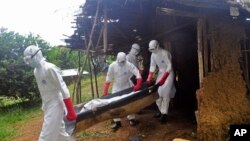More than a year after the largest Ebola epidemic ever recorded began in a remote part of Guinea, and five months after it was recognized as a public health emergency of international concern there is still much to be done to stop the outbreak, a top American health official said after returning from the three most affected nations.
Dr. Thomas Frieden, Director of the U.S. Centers for Disease Control, returned to the U.S. from West Africa December 21, where he spoke with patients and doctors; met with many of the CDC’s 170 staff members in the region; and met with the presidents, health ministers, and Ebola coordinators in each country. He described the situation as both inspiring and sobering.
“It is inspiring to see how much better the response has become in the past two months, how much international commitment there is, and, most importantly, how hard people from each of the three countries are working to stop Ebola,” Dr. Frieden said. “But it is sobering that Ebola continues to spread rapidly in Sierra Leone and that in parts of Monrovia and Conakry Ebola is spreading unabated. Improvements in contact tracing are urgently needed.”
At a briefing held to discuss the results of his trip to Guinea, Liberia, and Sierra Leone, Dr. Frieden described progress in some areas, but continued growth in Ebola cases in others.
“In Liberia, the outbreak has slowed dramatically and at the moment the country has the upper hand against the virus, in part due to improvements in access to Ebola Treatment Units and Community Care Centers, safe burials, and community engagement,” he said. “But the outbreak continues to surge in Sierra Leone, and there has been a troubling spread in Guinea’s capitol city. We’ve got a long way to go and this is no time to relax our grip on the response.”
The recent approval of $1.2 billion to strengthen international response and preparedness is crucial to stopping Ebola and improving global capacity to prevent, detect, and quickly respond to health threats like Ebola in the future.
As the United States and its partners continue to mobilize against the disease, we are also considering how to ensure that our immediate response measures contribute to long-term capacity to protect against infectious disease threats.






